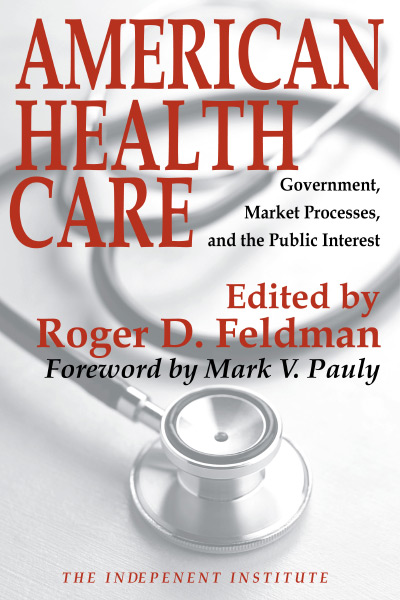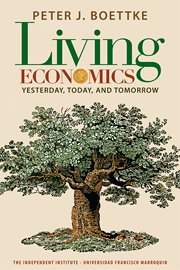| List Price: | ||
| Price: | $12.48 | |
| Discount: | $12.47 (Save 50%) |
| List Price: | ||
| Price: | $12.48 | |
| Discount: | $12.47 (Save 50%) |
Overview
This powerful book examines why harmful consequences too often follow when government sets out to direct our health care systems. It contrasts government programs and private market alternatives for supplying health care services.
American Health Care examines why harmful consequences too often follow when government sets out to direct health care. The book examines:
- How hospital rate regulation raises hospital prices
- “No-fault” medical malpractice increases the occurrence of faulty medicine
- FDA regulation is a major cause for escalating cost and delays of new drugs
- The special interest genesis of Medicare
- Consumer advantages of medical savings accounts and health contracts
American Health Care contrasts government and market options to supply health services, showing that the market can go further in performing critical functions in health care. This book is required reading for health policy-makers, economists, historians, and health care professionals.
Contents
- Foreword: Mark V. Pauly, Professor of Health Care Systems,University ofPennsylvania
- Introduction: Roger Feldman
- Part I. Health Insurance and Finance
- Chapter 1: The Genesis and Development of Medicare
- Ronald Hamowy, Professor of History, University of Alberta
- Chapter 2: Medicare’s Progeny: The 1996 Health Care Legislation
- Charlotte Twight, Professor of Economics, Boise State University
- Chapter 3: Making Room for Medical Savings Accounts in the US Health CareSystem
- Gail A. Jensen, Professor of Economics, Wayne State University
- Chapter 4:Freedom of Contract: The Unexplored Path to Health Care Reform
- Clark Havighurst, Professor of Law, Duke University
- Chapter 1: The Genesis and Development of Medicare
- Part II. Health Care Services
- Chapter 5: Health Regulation and Antitrust
- Barbara A. Ryan, Vice President, Capital Economics
- Chapter 6: Anti-Discrimination in Health Care: Community Ratings and Pre-Existing Conditions
- Richard A. Epstein, Professor of Law, University of Chicago
- Chapter 7: State Health Care Reform: Protecting the Provider
- Michael A. Morrisey, Professor of Health Care Organization, University of Alabama
- Chapter 5: Health Regulation and Antitrust
- Part III: Drugs and Medication
- Chapter 8: Regulation of the Pharmaceutical Industry
- Ronald W. Hansen, Professor of Management, University of Rochester
- Chapter 9: Ignorance is Death: The FDA’s Advertising Restrictions
- Paul H. Rubin, Professor of Economics, Emory University
- Chapter 10: Exploring Free Market Certification of Medical Devices
- Noel D. Campbell, Professor of Economics, North Georgia College & State University
- Chapter 8: Regulation of the Pharmaceutical Industry
- Part IV: Health Care Personnel
- Chapter 11: Physician Fees and Price Controls
- H.E. Frech, III, Professor of Economics, University of California, Santa Barbara
- Chapter 12: The Changing Role of Licensure in Promoting Incentives for Quality in Health Care
- Shirley V. Svorny, Professor of Economics, California State University,Northridge
- Chapter 13: Liability Reforms: Traditional and Radical Alternatives
- Patricia M. Danzon, Professor of Health Systems, University of Pennsylvania
- Chapter 11: Physician Fees and Price Controls
- Index
Detailed Summary
- Medical ignorance isn’t bliss, it’s required by law. FDA restrictions on advertising prevent firms from informing consumers of the full benefits of medicines. As a result, consumers are less healthy and pay far more.
- Rather than seeking price controls, seniors seeking to reduce the cost of prescription medicines should ask Congress to control the FDA–which raises the cost of new medicines through regulations. FDA delays in the approval of life-saving medicines–now lasting about eight years–cause tens of thousands of deaths each year.
- Reform medical malpractice laws to discourage frivolous lawsuits and encourage health-care providers to focus on actual treatments instead of “defensive medicine.” The number of unfounded lawsuits can be lessened, decreasing insurance costs, if courts and insurers learn more from doctors about the care they give.
- Medicare and Medicaid costs quickly exceeded projections after becoming law–some doubling in the first year! Caps, controls, and transfers to states have failed to rein in runaway expenditures on health care.
- Medical savings accounts (MSAs) and private contracts. MSAs would make health coverage portable and affordable, reducing the number of people uninsured, and consumers would see even greater savings and choices through private contracts for health-care services.
- The privacy of Americans is threatened as health records go online. The Health Insurance Portability and Accountability Act of 1996 authorizes the broad collection of “health information” and the assignment of a “unique health identifier” for health-care consumers.
- Licensed to care? Removing licensure requirements for health-care providers would lessen the medical labor shortage without sacrificing the quality of service.
In the United States today, one out of every seven dollars of income is spent on health care. Yet according to a variety of measures, such as life expectancy at birth or life expectancy at age 65, the American health care system performs poorly. The comprehensive new book, American Health Care: Government, Market Processes and the Public Interest, explains why our high-cost system produces inferior results, and it describes fundamental reforms to improve access to good quality, affordable health care. Unlike most efforts at reform, which would increase government control of health care—an approach that was rejected by the American public in 1994 and is increasingly being abandoned in Canada, Britain and elsewhere around the world—American Health Care argues for realistic, market-based policies based on deregulation, privatization, and greater reliance on competitive markets. Edited by Roger Feldman, professor of health insurance at the University of Minnesota, American Health Care contains the insights of prominent economists, legal scholars and historians who explore the origins of the current health-care system and its flaws, and propose practical and highly effective ways to resolve these problems.
Health Insurance and Finance
Ronald Hamowy, professor of history at the University of Alberta, opens American Health Care with a comprehensive review of Medicare’s genesis and development. Medicare costs began to rapidly exceed projections almost immediately following its passage into law by President Lyndon Johnson in 1965. What followed was a lengthy series of attempts to control costs, none of which have succeeded. Medicare has also distorted American health care in untold ways. In the physician fee schedule in place until 1996, for example, “physicians were paid far more for high-technology services than for basic care” and “practioners in rural areas were compensated at substantially lower rates than those practicing in cities.” As a result, costs were driven up and doctors were encouraged to move out of rural America. The current fee schedule attempts to reverse these distortions but the distortion of allocating medical services by bureaucratic fiat rather than by consumer desire remains. Charlotte Twight, professor of economics at Boise State University, complements Hamowy’s history of Medicare with a discussion of how legislation is passed without the public’s knowledge or approval. In so doing, such policies not only have created health-care problems, but are the basis for blatant and unnecessary intrusions into the privacy of Americans. Twight focuses her attention on little known provisions of the 1996 health care legislation that created “a national electronics database threatening the privacy of individual’s medical records.” American Health Care then considers reforms of the financing of health-care services directly. Clark Havighurst, professor of law at Duke University, argues that fundamentally the current insurance system offers us only two choices: insurance guaranteeing the most technologically advanced and sophisticated health care available anywhere in the world, or no insurance at all. Affordable intermediate choices could be made available if judges would respect well-specified contracts which limit payments based on economics and not just on ill-defined “medical necessity.” Health-care reform should not make the best an enemy of the good. Contractual reform promises a realistic hope of making good quality health care more affordable and widely available. Medical Savings Accounts (MSAs) also offer realistic hope for reform. Gail Jensen, professor of economics in the Institute of Gerontology at Wayne State University, explains the economics of MSAs and concludes that their widespread use would produce a number of significant benefits including “lowering health care costs, reducing the number of uninsured, and fostering increased personal savings for long-term care expenses.”
Health Care ServicesPart two of American Health Care examines the regulation of hospitals, pharmacies, and other health-care services. Michael Morrisey, director of the Lister Hill Center for Health Policy at the University of Alabama, points out that in response to greater competition many health-care providers have turned to state governments to help them to cartelize their industries and keep prices and profits above competitive levels. Certificate-of-need (CON) laws are supposed to lower costs but, Morrisey writes, the “exhaustive literature on CON yields virtually no evidence that it has controlled costs.” Instead, CON laws have “restricted the entry of new hospitals” and, as a result, increased prices. Morrisey’s evaluation of CON laws is seconded by Barbara Ryan, vice president of Capital Economics, who examines CON regulations and their peculiar interaction with antitrust regulation. Richard Epstein, professor of law at the University of Chicago, then presents an examination of the unintended consequence of regulations governing community ratings and preexisting conditions.
Drugs, Devices, and MedicationPart three of American Health Care examines the regulation of drugs and other health-care products. Ronald Hansen, senior associate dean at the Graduate School of Management at the University of Rochester, notes that over the past four decades the costs of developing new drugs has more than tripled and the evidence “points to regulation as one of the major causes of increased development cost.” As a result of higher costs, the yearly number of new drugs has declined dramatically since the early 1960s. Hundreds of thousands of people may have died or had reduced life experiences because higher regulatory costs made uneconomic the research and development necessary to produce new drugs. Noel Campbell, professor of economics at North Georgia College and State University, finds that Food and Drug Administration (FDA) delays in approving medical devices has caused thousands of deaths. Campbell notes that consumers are protected from unsafe electrical devices like toasters, televisions, and smoke alarms by competitive, certifying agents like Underwriters Laboratories. He proposes that “independent, privately funded institutions” replace FDA review and approval of drugs and medical devices. FDA restrictions on advertising concern Paul Rubin, professor of economics and law at Emory University, who shows that the FDA ban on advertising aspirin as a preventative measure for heart attacks “undoubtedly causes tens of thousands of needless deaths per year. Elimination of this ban would probably be one of the simplest measures to reduce death rates available.”
Health Care PersonnelThe regulation of health care personnel is the subject of part three of American Health Care. H. E. Frech, professor of economics at the University of California at Santa Barbara, finds that price controls on physician fees are so pernicious that the key principal of any reform must be “the absence of price controls in any form and under any euphemism.” Shirley Svorny, professor of economics at California State University, Northridge, finds licensure laws for physicians of diminished value and suggests that the states experiment with allowing increased roles for non-physician providers. Patricia Danzon, professor of health-care systems and insurance in the Wharton at the University of Pennsylvania, calls for reform of medical malpractice laws to limit non-economic damages and discourage speculative litigation. However, such reforms as shifting to a no-fault compensation system would create “unnecessary injuries” and should be avoided.
A Timely and Powerful BookAmerican Health Care is an exciting, comprehensive, and very timely volume that challenges the conventional wisdom on health-care provision and offers practical de-bureaucratization proposals for reform that would produce dramatic cost reductions, better quality, and greater access for all Americans, especially the most disadvantaged.
Praise
“Health care debate has too often been done ad hoc within a climate of political expediency.The excellent book, American Health Care, provides a comprehensive examination of the full scope of health care issues.Anyone interested in the future of health care should read this important and innovative book.”
—PAUL J. FELDSTEIN, Professor of Economics, Graduate School of Management, University of California, Irvine
“Markets, government and how to get them to work together is the exciting subject of this must-read bookAmerican Health Care.You vitally need to understand the issues and dilemmas it addresses.”
—C. EUGENE STEUERLE, Senior Fellow, The Urban Institute
“Tracing government involvement in health care from Otto von Bismarck’s 1883 health insurance plan for factory and mine workers to the Food and Drug Administration’s easing of advertising restrictions in 1997, American Health Care: Government, Market Processes and the Public Interest declares that government needs to get out of the health care business. The case for a market-based public policy approach to health care problems is cogently laid out. Regardless of political affiliation, for students of health policy, this book’s wealth of information and interesting insights make it well worth reading.”
—NATIONAL JOURNAL
“American Health Care is excellent with great pieces by some excellent scholars.”
—ALAIN C. ENTHOVEN, Marriner S. Eccles Professor, Graduate School of Business, Stanford University
“Most health-care policy tomes are anachronistically built around the ‘should’ word, as in the government ‘should’ solve all the problems of the health care system.In contrast, the refreshing book, American Health Care, explores the appropriate roles of markets and government in health care with candor, authority, insight, and sprightly prose. Bravo!”
—REGINA E HERZLINGER, Professor of Business Administration, Harvard University
“American Health Care illustrates that careful analysis trumps political rhetoric. Containing some of the country’s best thinkers on health markets, this excellent, fascinating and much-needed book lays out the tradeoffs we face in improving our system.The book provides a far better prescription for health policy than the simplistic remedies so often heard in Washington.”
—ROBERT B. HELMS, Director, Health Policy Studies, American Enterprise Institute
“American Health Care provides a wonderful wealth of knowledge for anyone trying to understand the modern health economy.”
—DAVID S. DRANOVE, Professor of Economics, Northwestern University
“American Health Care challenges the concept that government can effectively manage the nation’s health care. The book provides insight that allows learned readers to speculate about where markets can take health care now and in the future. This work presents concepts that are intended to generate constructive conversation toward the improvement of health care. American Health Care has provided ample scholarship to do so.”
—BUSINESS INFORMATION ALERT
Author
Roger D. Feldman is Professor of Health Insurance, Center for Health Services Research at the University of Minnesota and a Research Fellow at The Independent Institute.
















